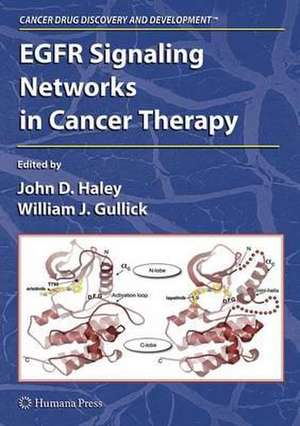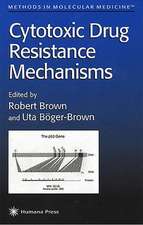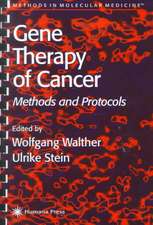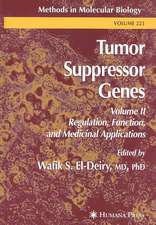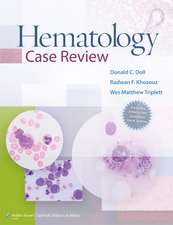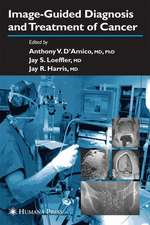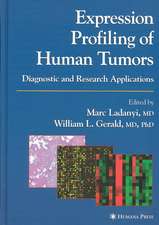EGFR Signaling Networks in Cancer Therapy: Cancer Drug Discovery and Development
Editat de John D. Haley, William John Gullicken Limba Engleză Paperback – 20 ian 2011
| Toate formatele și edițiile | Preț | Express |
|---|---|---|
| Paperback (1) | 1407.58 lei 38-44 zile | |
| Humana Press Inc. – 20 ian 2011 | 1407.58 lei 38-44 zile | |
| Hardback (1) | 1297.43 lei 38-44 zile | |
| Humana Press Inc. – 25 sep 2008 | 1297.43 lei 38-44 zile |
Din seria Cancer Drug Discovery and Development
- 5%
 Preț: 1474.98 lei
Preț: 1474.98 lei - 5%
 Preț: 1108.35 lei
Preț: 1108.35 lei - 5%
 Preț: 1415.75 lei
Preț: 1415.75 lei - 5%
 Preț: 1370.22 lei
Preț: 1370.22 lei - 5%
 Preț: 1452.28 lei
Preț: 1452.28 lei - 5%
 Preț: 1316.76 lei
Preț: 1316.76 lei - 5%
 Preț: 1439.50 lei
Preț: 1439.50 lei - 5%
 Preț: 1113.63 lei
Preț: 1113.63 lei - 5%
 Preț: 1126.24 lei
Preț: 1126.24 lei - 24%
 Preț: 1037.62 lei
Preț: 1037.62 lei - 5%
 Preț: 1466.37 lei
Preț: 1466.37 lei - 5%
 Preț: 1350.83 lei
Preț: 1350.83 lei - 5%
 Preț: 1417.54 lei
Preț: 1417.54 lei - 5%
 Preț: 1113.46 lei
Preț: 1113.46 lei - 5%
 Preț: 1428.54 lei
Preț: 1428.54 lei - 5%
 Preț: 1429.80 lei
Preț: 1429.80 lei - 5%
 Preț: 782.10 lei
Preț: 782.10 lei - 5%
 Preț: 1438.58 lei
Preț: 1438.58 lei - 5%
 Preț: 1110.32 lei
Preț: 1110.32 lei - 5%
 Preț: 1434.39 lei
Preț: 1434.39 lei - 5%
 Preț: 1365.85 lei
Preț: 1365.85 lei - 5%
 Preț: 1461.08 lei
Preț: 1461.08 lei - 5%
 Preț: 1106.86 lei
Preț: 1106.86 lei - 5%
 Preț: 982.20 lei
Preț: 982.20 lei - 5%
 Preț: 727.80 lei
Preț: 727.80 lei - 5%
 Preț: 1331.78 lei
Preț: 1331.78 lei - 5%
 Preț: 1297.43 lei
Preț: 1297.43 lei - 5%
 Preț: 1124.59 lei
Preț: 1124.59 lei - 5%
 Preț: 1433.10 lei
Preț: 1433.10 lei - 5%
 Preț: 1110.90 lei
Preț: 1110.90 lei - 5%
 Preț: 1317.79 lei
Preț: 1317.79 lei - 5%
 Preț: 1464.91 lei
Preț: 1464.91 lei - 5%
 Preț: 1939.63 lei
Preț: 1939.63 lei - 5%
 Preț: 1418.48 lei
Preț: 1418.48 lei - 5%
 Preț: 1438.94 lei
Preț: 1438.94 lei - 5%
 Preț: 1100.30 lei
Preț: 1100.30 lei - 5%
 Preț: 1109.96 lei
Preț: 1109.96 lei - 5%
 Preț: 990.60 lei
Preț: 990.60 lei - 5%
 Preț: 1443.13 lei
Preț: 1443.13 lei - 5%
 Preț: 1428.91 lei
Preț: 1428.91 lei - 5%
 Preț: 787.58 lei
Preț: 787.58 lei - 5%
 Preț: 1311.75 lei
Preț: 1311.75 lei - 5%
 Preț: 1331.78 lei
Preț: 1331.78 lei - 5%
 Preț: 1113.11 lei
Preț: 1113.11 lei - 5%
 Preț: 1440.76 lei
Preț: 1440.76 lei
Preț: 1407.58 lei
Preț vechi: 1481.66 lei
-5% Nou
Puncte Express: 2111
Preț estimativ în valută:
269.38€ • 280.19$ • 222.38£
269.38€ • 280.19$ • 222.38£
Carte tipărită la comandă
Livrare economică 10-16 aprilie
Preluare comenzi: 021 569.72.76
Specificații
ISBN-13: 9781617378539
ISBN-10: 1617378534
Pagini: 408
Ilustrații: XI, 395 p.
Dimensiuni: 178 x 254 x 21 mm
Ediția:2008
Editura: Humana Press Inc.
Colecția Humana
Seria Cancer Drug Discovery and Development
Locul publicării:Totowa, NJ, United States
ISBN-10: 1617378534
Pagini: 408
Ilustrații: XI, 395 p.
Dimensiuni: 178 x 254 x 21 mm
Ediția:2008
Editura: Humana Press Inc.
Colecția Humana
Seria Cancer Drug Discovery and Development
Locul publicării:Totowa, NJ, United States
Public țintă
ResearchCuprins
EGFR Signaling Networks.- EGFR Receptor Family Extracellular Domain Structures and Functions.- EGFR family heterodimers in cancer pathogenesis and treatment.- Structure-function of EGFR kinase domain and its inhibitors.- Internalization and degradation of EGF receptor.- Differential dependence of EGFR and ErbB2 on the molecular chaperone Hsp90.- Activation of STATs 3 and 5 Through the EGFR Signaling Axis.- The intersection of EGFR and the Ras signaling pathway.- PHOSPHOINOSITIDE 3-KINASE ENZYMES AS DOWNSTREAM TARGETS OF THE EGF RECEPTOR.- Convergence of EGF Receptor and Src Family Signaling Networks in Cancer.- A Molecular Crosstalk between E-cadherin and EGFR Signaling Networks.- Crosstalk Between Insulin-like Growth Factor (IGF) and Epidermal Growth Factor (EGF) Receptors.- Negative regulation of signaling by the EGFR family.- Nuclear ErbB Receptors: Pathways and Functions.- Temporal Dynamics of EGF Receptor Signaling by Quantitative Proteomics.- Computational and Mathematical Modelling of the EGF Receptor System.- EGFR in Tumorigenesis and EGFR Tyrosine Kinase Inhibitors in Cancer Therapy.- Expression and prognostic significance of the EGFR in solid tumors.- Signalling by the EGF receptor in human cancers: accentuate the positive, eliminate the negative.- EGFR signaling in invasion, angiogenesis and metastasis.- Constitutive activation of truncated EGF receptors in glioblastoma.- EGFR Mutations, Other Molecular Alterations Related To Sensitivity to EGFR Inhibitors, and Molecular Testing for EGFR-Targeted Therapies in Non-Small Cell Lung Cancer.- Crosstalk Between COX-2 and EGFR: A Potential Therapeutic Opportunity.- Cellular sensitivity to EGF receptor inhibitors.- Utilizing combinations of molecular targeted agents to sensitize tumor cells to EGFR inhibitors.
Recenzii
From the reviews:
"This book describes the state of EGFR antagonist development and treatment modalities…. This will be of interest to those in academic research studying EGFR signaling and/or cancer. … This is an excellent reference for those focused on a particular aspect of EGFR signaling who are looking for a concise review. This is a timely review of an increasingly complex area of study." (James P. Luyendyk, Doody’s Review Service, January, 2009)
"This book bridges the basic and clinical progress in EGFR network in cancer therapy over 40 years of EGFR research. Due to the contributors’ basic science and clinical backgrounds, the book is … best suited for basic scientists, translational scientists, and oncologists who engage in EGFR associated research and clinical therapy at various levels. The book provides a comprehensive EGFR resource for researchers not only in basic biological fields but also in preclinical and clinical therapy … ." (Guolin Zhang and Eric B. Haura, Cancer Control, Vol. 16 (4), October, 2009)
“This book is a collection of articles from different authors organized into two sections. … a good and useful book for any medicinal chemist working in this field … . all chapters are well written, clear, and rather agreeable to read. … easily understood by even an inexperienced reader. … a useful introduction to the role of EGFR signaling networks in a large number of tumors for novice researchers, but it could also be considered in some way a reference text for more experienced ones.” (Adriano Martinelli, ChemBioChem, Vol. 5, 2010)
"This book describes the state of EGFR antagonist development and treatment modalities…. This will be of interest to those in academic research studying EGFR signaling and/or cancer. … This is an excellent reference for those focused on a particular aspect of EGFR signaling who are looking for a concise review. This is a timely review of an increasingly complex area of study." (James P. Luyendyk, Doody’s Review Service, January, 2009)
"This book bridges the basic and clinical progress in EGFR network in cancer therapy over 40 years of EGFR research. Due to the contributors’ basic science and clinical backgrounds, the book is … best suited for basic scientists, translational scientists, and oncologists who engage in EGFR associated research and clinical therapy at various levels. The book provides a comprehensive EGFR resource for researchers not only in basic biological fields but also in preclinical and clinical therapy … ." (Guolin Zhang and Eric B. Haura, Cancer Control, Vol. 16 (4), October, 2009)
“This book is a collection of articles from different authors organized into two sections. … a good and useful book for any medicinal chemist working in this field … . all chapters are well written, clear, and rather agreeable to read. … easily understood by even an inexperienced reader. … a useful introduction to the role of EGFR signaling networks in a large number of tumors for novice researchers, but it could also be considered in some way a reference text for more experienced ones.” (Adriano Martinelli, ChemBioChem, Vol. 5, 2010)
Textul de pe ultima copertă
The epidermal growth factor (EGF) receptor and its downstream signal transduction networks have been implicated in the ontology and maintenance of tumor tissues, which has motivated the discovery and development of molecularly targeted anti-EGFR therapies. Edited by John Haley and William J. Gullick, EGFR Signaling Networks in Cancer Therapy, is separated into two sections. The first of which probes the molecular pathways and the intersection of signaling networks which are frequently deregulated in human cancers, with a view to describing EGF receptor in a tumor tissue specific context. Meanwhile, the second section illustrates the many ways in which EGF receptor contribute to abnormal survival and migration signaling in cancer cells and to epithelial to mesenchymal transition and metastasis. The book also describes the mitogenic, survival, adhesive and migratory pathways within a framework of interacting subsystems that contribute to the activity and physiological regulation of the receptor in normal and neoplastic tissues. Even though there is still much to learn, this volume explores this fascinating system with compelling information.
Caracteristici
Probes the molecular pathways and the intersection of signaling networks which are frequently deregulated in human cancers Describes EGF receptor in a tumor tissue specific context Illustrates the many ways in which EGF receptors contribute to abnormal survival and migration signaling in cancer cells and to epithelial-to-mesenchymal transition and metastasis
